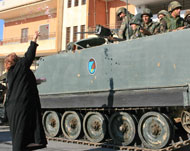Lebanon raises flag after Israeli pullout
Lebanon’s army commander has raised his country’s flag on a ridge overlooking the border with Israel, reclaiming the area after Israel’s pullout from nearly all of south Lebanon.

But the dispute over a divided border village and farmlands marred Lebanon’s reclamation of its territory on Monday.
Emile Lahoud, the Lebanese president, accused Israel of failing to live up to its commitments under the UN ceasefire resolution by holding on to Lebanese territory and violating the country’s sovereignty.
General Michel Suleiman told about 500 soldiers that the army would not allow any attacks from Lebanon that could undermine the ceasefire, an apparent reference to rockets Hezbollah launched at Israel from the south in 34 days of fighting that ended on August 14.
Suleiman said: “Stay vigilant to uphold the law and deter whoever undermines the course of security and stability.”
He said that although his army is no match for Israel, it would fight if necessary.
“I call upon you to confront the Israeli aggressions and violations with whatever meagre capabilities that are available,” he said.
The United Nations-brokered ceasefire supports the Lebanese military in reasserting control over the south, including areas last held by the national army 30 years ago.
Suleiman inspected the troops during the ceremony at a Lebanese base and unveiled a plaque that said he had served there as a lieutenant in 1970.
Worries
But the continued presence of the Israeli army in part of the border village of Ghajar and its plans to continue patrolling Lebanese airspace are potential sources of friction between the neighbours.
Lahoud said on Monday Israel “has no right to violate our airspace and territorial waters,” adding that Lebanon wants its prisoners back and wants Israel to abandon the Lebanese side of Ghajar.
|
“Our right of resistance is always there” Nabih Berri, |
Lahoud also said before convening a Cabinet meeting that the dispute over the Shebaa Farms area, held by Israel, was “the basis of the problems”.
Before the meeting Fuad Saniora, the prime minister, said the UN was working to resolve the Ghajar problem.
Resolution 1701, which opened the way for the ceasefire, directs the UN secretary-general to come up with a proposal to delineate the borders in the area near the frontiers of Israel, Lebanon and Syria within a now-elapsed 30 days.
Lebanese troops were expected to fan out the areas newly vacated by Israel beginning on Monday.
An army spokesman said Lebanese army deployment in the south has exceeded the 15,000 troops mandated by the UN ceasefire resolution.
The spokesman requested anonymity in compliance with military regulations.
Reactions
International peacekeepers, the United Nations Interim Force in Lebanon (Unifil), called Israel’s pullout from nearly all of south Lebanon “significant progress”.
 |
|
A woman throws rice on soldiers |
But both the Lebanese government and Hezbollah dismissed the withdrawal on Sunday as “incomplete” and demanded Israel stop what they called its violations of Lebanon’s airspace, sea and land.
Nabih Berri, the parliamentary speaker, and a close ally of Hezbollah, said that armed attacks could resume if Israel did not fulfill the UN ceasefire resolution.
“Our right of resistance is always there,” he told As-Safir newspaper on Monday about efforts to regain captured territory.
A senior Hezbollah official, Hassan Ezzeddine, said the group would resume attacks against Israel if it breached the ceasefire.